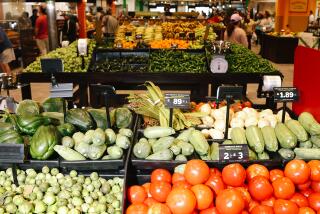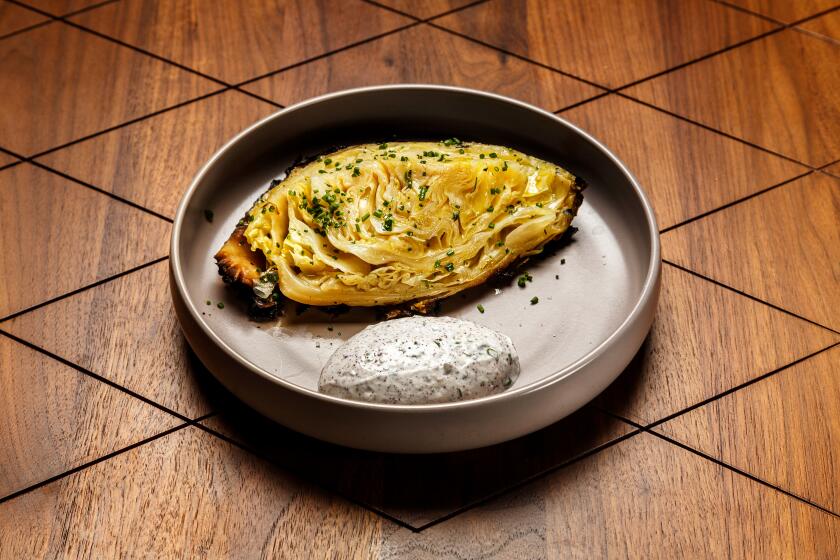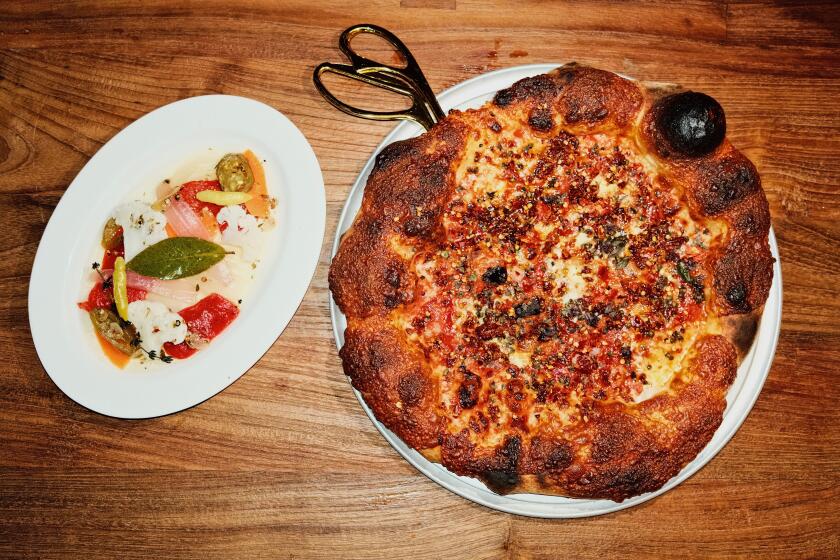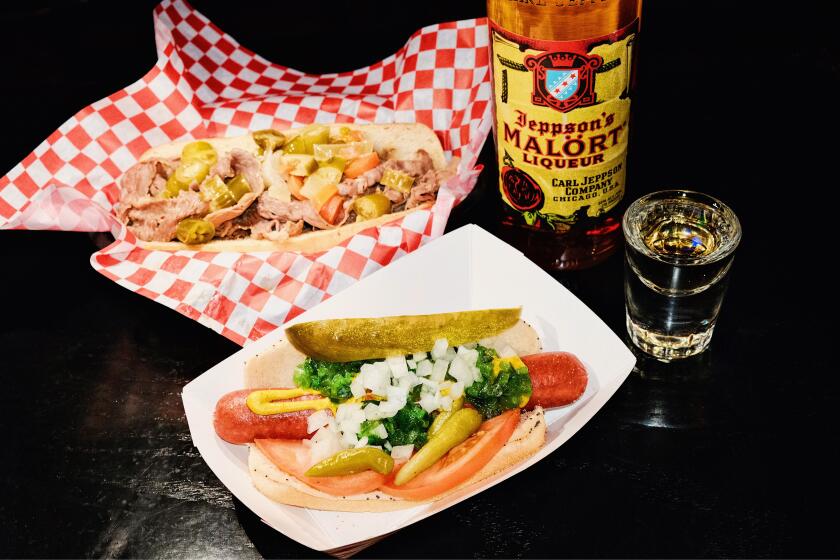Essay: A rookie Thanksgiving Day cook takes over the kitchen
It is Thanksgiving morning. As you read this, the bird, a fine 16-pounder, is coming to room temperature on the counter. The green beans have been topped and tailed, and my fingertips smart from peeling smoking-hot chestnuts for the stuffing. I’ve reminded my mother-in-law that she needn’t bring the cranberry sauce — my cranberries are chilling in the refrigerator next to the bottles of Alsatian Riesling.
I still have to blanch the Brussels sprouts, whip the cream and peel a mountain of potatoes, but I am locked into the rhythm of the day. My knife work is clumsy, and my soufflés may occasionally fall, but I know how to do this meal. I’m not sure which direction the bourbon will flow this afternoon or which smoldering resentments are going to erupt into hot flame, but the turkey skin will be crisp, the mashed potatoes buttery and the gravy tawny and smooth.
Other American holidays have special dishes associated with them, and the calendar would be poorer without Easter lamb, Hanukkah latkes or fried chicken on the Fourth of July. But Thanksgiving is the cook’s holiday, the only one that revolves entirely around food. The sweet scent of fresh sage and caramelized onions and the faint burble of turkey stock on the stove signify family, and warmth and home.
I should note that even though I have rehearsed this menu two dozen times, this is the first time I have cooked an actual Thanksgiving dinner. The honor went to my mother until her passing in 1994, and, until this year, the family gathered at an aunt’s house in Walnut Creek.
During those years, I held an annual pre-Thanksgiving dinner, on the Sunday before the holiday, when I plied my friends with creamed leeks and chard-stem gratin before hitting them with whatever the year’s turkey happened to be. Fashions in turkey tend to change from year to year, and when you’re a food writer, you are almost obligated to try wet-brined turkey one year and dry-brined turkey the next; Chinatown turkey stuffed with sticky rice and Chinese sausage or Cuban turkey rubbed down with lemon and garlic; high-heat turkey done in 75 minutes or turkey slow-roasted at a temperature that alarms epidemiologists.
But a Sunday-night turkey dinner is different from Thanksgiving, and it is futile to pretend that it is not. Even if you don’t like putting marshmallows on your sweet potatoes, on the actual holiday you will include them if your family has always served them that way. If you disdain canned fried onion strips, get over it. If you embargo ambrosia, you will inevitably discover everyone in the backyard, gathered around Aunt Debbie’s forbidden bowl. The stuffing you make will probably be the one that your grandmother used to make, and your children won’t like it any more than you did when you were 9 years old.
As willfully unconscious as we are of a time before Brussels sprouts were roasted with aged balsamic and fashionably artisanal lardons, even the most ardent cooks among us are not so far removed from the boxed stuffing, canned yams and mashed-potato buds of our fairly immediate past. When Ruth Reichl was food editor at The Times, she wrote about Ian Dengler, a food historian who could tell you where you grew up when you told him what your family ate. (“When someone says, ‘It’s just the ordinary turkey,’ I know right away that I’m dealing with the great Middle West,” Dengler said.)
Consider the continuing reliance on Butterball, purveyor of bland birds and the target of animal rights groups claiming birds have been abused: The company hotline still fields 12,000 calls on Thanksgiving Day alone. Facebook feeds this week have been clogged with debates between cooks sharing tips on blind-baked pie crusts and noncooks eyeing supermarket pies; between those who make cranberry sauce from scratch and those for whom the relish barely exists without telltale ridge marks from the can. Nostalgia for the canned sauce is so great that a company called Pacific Natural Foods is marketing an organic version.
Still, I have developed my own traditions over two decades of alternative Thanksgiving, and this year, as I attempt my first “real” adult celebration, they are going to die hard. My brother, who once threw a childhood fit over a hunk of boiled cauliflower, is probably not going to try my Brussels sprouts, no matter how delicious. But I’m serving them anyway. My creamed leeks are not part of our family’s repertoire — the recipe was born one year in a failed attempt to make Paula Wolfert’s stuffed potato pancakes — but I can’t imagine Thanksgiving without them. I will make my stuffing with apple sausage and chestnuts instead of corn bread and the sagey breakfast sausage my mother used to love, because at this point my own children would protest if it were otherwise.
There will be arguments. There will be tears. There will be buttermilk mashed potatoes. And my elitist Heritage bird, farmers-market-sourced, organic-cranberry dinner may become the family’s new Thanksgiving tradition. Or not.
More to Read
Eat your way across L.A.
Get our weekly Tasting Notes newsletter for reviews, news and more.
You may occasionally receive promotional content from the Los Angeles Times.
![LOS ANGELES, CA - JUNE 17: [Cody Ma and Misha Sesar share a few dishes from their Persian Restaurant Azizam] on Monday, June 17, 2024 in Los Angeles, CA. (Ethan Benavidez / For The Times)](https://ca-times.brightspotcdn.com/dims4/default/7ffc7f6/2147483647/strip/true/crop/5110x3417+306+0/resize/320x214!/quality/75/?url=https%3A%2F%2Fcalifornia-times-brightspot.s3.amazonaws.com%2F79%2Fdc%2F4d29255545f5b9813315901692bc%2F1459972-fo-azizam-review20-eba.JPG)






